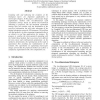2084 search results - page 212 / 417 » Proving Time Bounds for Randomized Distributed Algorithms |
134
click to vote
GECCO
2007
Springer
15 years 8 months ago
2007
Springer
In the longest common subsequence problem the task is to find the longest sequence of letters that can be found as subsequence in all members of a given finite set of sequences....
107
Voted
GECCO
2006
Springer
15 years 6 months ago
2006
Springer
Memetic algorithms are evolutionary algorithms incorporating local search to increase exploitation. This hybridization has been fruitful in countless applications. However, theory...
123
Voted
MVA
2007
15 years 4 months ago
2007
Counting cells and following the evolution of the biological layers are important applications in microscopic imagery. In this paper, a microscopic image segmentation method with ...
110
Voted
CDC
2008
IEEE
15 years 9 months ago
2008
IEEE
— We study the problem of reaching a consensus in the values of a distributed system of agents with time-varying connectivity in the presence of delays. We consider a widely stud...
153
Voted
STOC
2012
ACM
13 years 5 months ago
2012
ACM
We give the first time-space tradeoff lower bounds for Resolution proofs that apply to superlinear space. In particular, we show that there are formulas of size N that have Reso...




